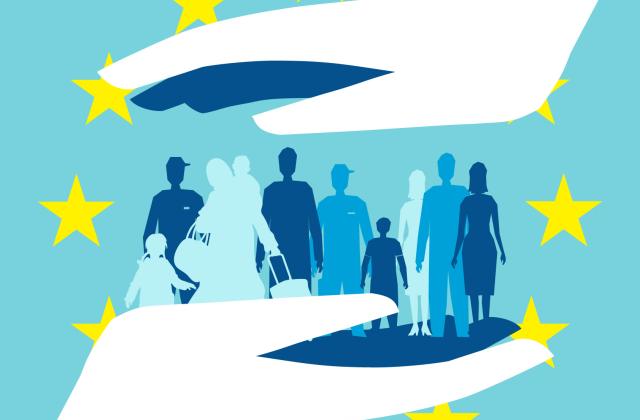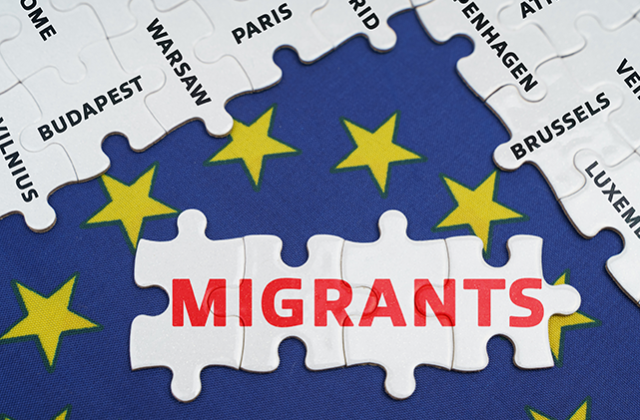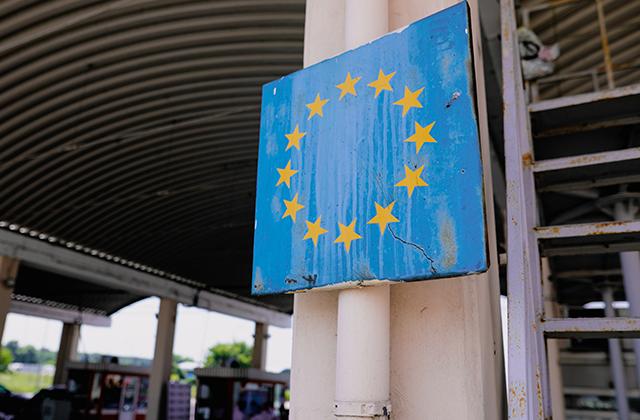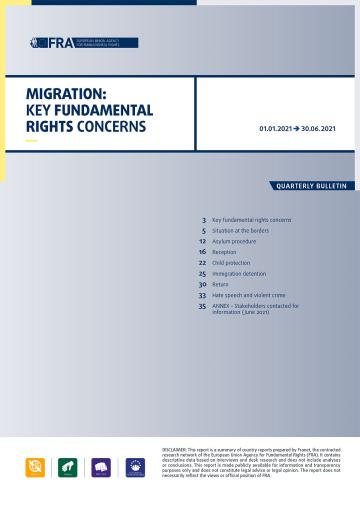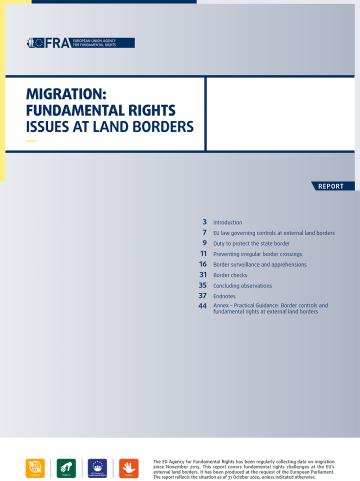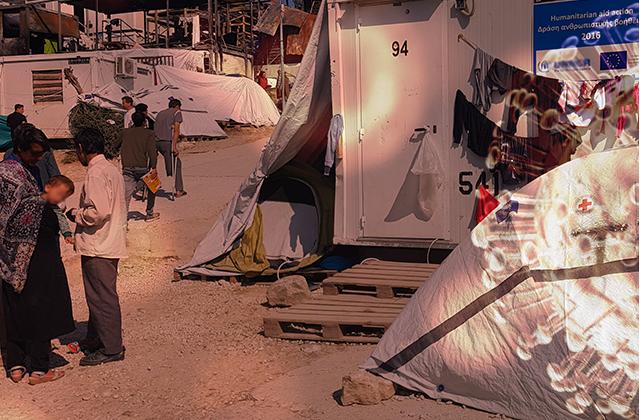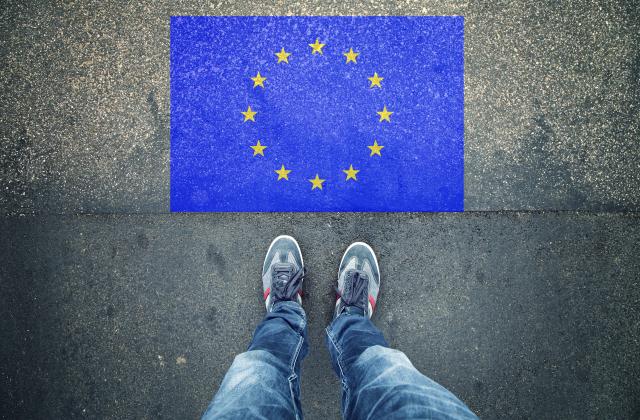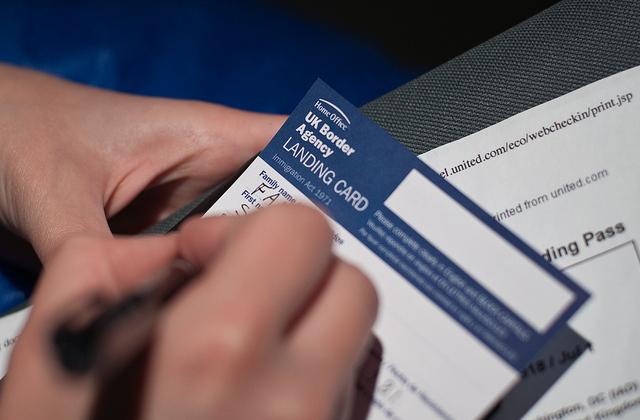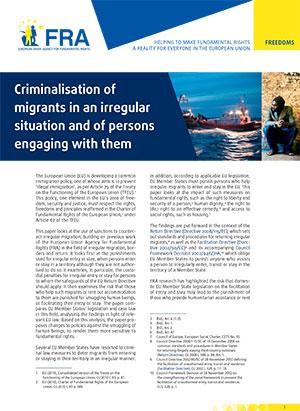- Over the past five years, some third countries have encouraged or even arranged for migrants and refugees to cross into the European Union (EU), using them as tools to pressure the EU or its Member States for political purposes. Such a phenomenon, which EU law defines as the ‘instrumentalisation of migrants’, aims at destabilising the EU or a Member State.
- The EU and its Member States can take action to counter this phenomenon. They have tools at their disposal, which are legal and legitimate, provided they apply them in full respect of EU fundamental rights law, national constitutional law and international law. This FRA (European Union Agency for Fundamental Rights) position paper analyses what EU fundamental rights law requires.
- Addressing the instrumentalisation of migrants and refugees must not overshadow the human reality and the vulnerability of the people being instrumentalised. In 2023 and 2024, almost 60 people died along the EU land border with Belarus, many from hypothermia while stranded there. In Poland, Médecins Sans Frontières (MSF) treated over 220 people coming across the Belarus border in 2023, 10 % of whom needed life-saving referrals.
- Many responses to instrumentalisation involve limitations to rights guaranteed in the European Union Charter of Fundamental Rights (the Charter). Under Article 52(1) of the Charter, limitations of fundamental rights must be provided for by law, be necessary and proportionate and respect the essence of the right. Certain rights are absolute and cannot be restricted or derogated from. Even in times of war or other public emergencies threatening the life of the nation, there can be no limitation to some rights, in particular the prohibition of torture and other forms of ill-treatment and the principle of non-refoulement, which prohibits returns to persecution or serious harm. De jure or de facto denial of access to asylum procedures breaches Article 18 of the Charter on the right to asylum.
- Some of the actions taken to counter instrumentalisation – particularly those targeting migrants and refugees – entail a heightened risk of crossing a red line. They may have long-lasting consequences for the protection of fundamental rights at the EU’s external borders. They may ultimately undermine the nature of asylum as a fundamental right.
- EU law sets a high threshold for a situation to be labelled as instrumentalisation. In particular, the hostile action must be of such intensity as to objectively put at risk essential state functions. Any exceptional restriction of third-country nationals’ fundamental rights as allowed by the Charter must remain confined to countering only those situations which fulfil the strict definition of instrumentalisation. They must be limited in time.
- Responses to instrumentalisation must not become a blueprint for the treatment of all migrants and refugees crossing the border in an unauthorised manner. The instruments adopted with the pact on asylum and migration, which will apply as of mid-2026, provide legal and policy responses to manage such arrivals, including in case of large-scale movements.
- Nor should the response to such exceptional instances of instrumentalisation become the way to respond to migrant smuggling and the facilitation of irregular entry. There, repressive measures must target the criminal networks involved – in accordance with the UN Anti-smuggling Protocol, which is binding upon the EU and most of its Member States – and not punish the individuals who are the object of the crime of migrant smuggling. Also, measures against migrant smuggling should not target humanitarian actors supporting migrants and asylum seekers at EU external borders.
- This paper lists four types of actions to counter the phenomenon of the instrumentalisation of migrants and refugees. The first set of actions are those targeting the actor who instrumentalises such people. These may include combating state-sponsored smuggling of migrants, imposing sanctions and other national law measures and restricting visa policies. These measures may entail restrictions to fundamental rights, for example the right to respect for family life in Article 7 of the Charter or the freedom to conduct a business set out in Article 16 of the Charter, when restricting visa policies. Restrictions to such rights are possible, provided they are provided for by law, are necessary and proportionate to counter instrumentalisation, and do not impair the essence of the right as required by Article 52(1) of the Charter.
- The second set of actions to counter the instrumentalisation of migrants and refugees is to target transport companies and other commercial operators actively involved in transporting migrants to the EU or to its external borders on behalf of a third country. These may range from softer measures, such as the training of airline staff, to sanctions or the revocation of operating licences when airlines do not meet good repute requirements. When such measures restrict fundamental rights, for example the freedom to conduct a business set out in Article 16 of the Charter, limitations must meet the requirements of Article 52(1) of the Charter. Equality before the law and non-discrimination, as protected by Articles 20 and 21 of the Charter, must equally be respected.
- The third set of actions relates to the way the EU and its Member States deal with instrumentalised third-country nationals who arrive in the EU. Member States may close border crossing points to traffic or limit their opening hours. Border guards may undertake more thorough checks to verify any security risks. Border surveillance may be strengthened. As soon as the instruments adopted with the pact on migration and asylum apply in mid-2026, Member States may ask for more time to register asylum applications and may process them in the asylum border procedures, with limitations as regards children and applicants with specific needs. EU law will enable Member States to carry out returns of asylum applicants rejected in a border procedure through a swifter return border procedure.
- Most of these actions fall within the scope of EU law and the Charter applies to them. Without being exhaustive, at least seven fundamental rights safeguards require particular attention when taking measures targeting instrumentalised migrants or refugees. First, the use of force must always remain necessary and proportionate. Second, persons in distress must be rescued and assisted. Third, the principle of non-refoulement must always be respected. Fourth, collective expulsions are prohibited. Fifth, denying access to asylum procedures is unlawful. Sixth, deprivation of liberty requires an individual necessity and proportionality assessment. Seventh, authorities must pay due attention to persons with specific needs.
- These core safeguards relate to Article 2 (right to life), Article 3 (right to the integrity of the person), Article 4 (the prohibition of torture and inhuman or degrading treatment or punishment), Article 6 (right to liberty), Article 18 (right to asylum) and Article 19(2) (protection in the event of removal, expulsion or extradition), along with Articles 24 to 26 of the Charter, protecting children, the elderly and persons with disabilities.
- The fourth set of actions relates to the trend to militarise borders. Border management authorities may share more operational information with the military and entrust them with supporting border control functions. These activities are regulated by EU law and must be implemented in full compliance with the Charter. Any actor carrying out border management functions, including the armed forces, must be sufficiently trained on fundamental rights and receive clear and unambiguous instructions on the limits of the use of force, the prohibition of ill-treatment and the need to refer any apprehended third-country national to the responsible authority.
-
Finally, the trend to militarise borders blurs the lines between border management – which falls within the scope of EU law and to which the Charter applies – and defence policies, where Member States typically act outside the scope of EU law. This creates a real risk of circumventing EU fundamental rights law. Dual-purpose technologies – meaning technologies which may serve both civilian and military purposes – may be designed by defence actors without having to assess if they are Charter-compliant and subsequently deployed at borders not only for defence purposes but also in support of border management. For example, physical barriers or fences at borders erected as a defence measure may be equipped with coil-shaped blades or other dangerous technical features without assessing if these are necessary and proportionate in light of the right to physical integrity in Article 3 of the Charter.





